libraries in translation
an Italian library via London, Paris, Middle-earth and etymonline.com
news from The Nature Library
Tomorrow, Saturday 12 July, The Nature Library and Scottish Maritime Museum are hosting a seriously unmissable collaboration between site-specific theatre company Oceanallover and bookbinder Juju Books. Free to attend, just turn up to The Nature Library at 2pm where a street procession will take you to the Maritime Museum, or you can come straight to the museum for the performance beginning at approximately 2.30. Full details here.
Last month, The Nature Library and St Andrews Botanic Garden hosted the first meeting of It’s Only the End of the World, a book group unearthing narratives that encourage us to question, reflect, and reimagine the futures yet to come, asking what it means to live through moments of profound change and how literature can equip us to witness and engage with these shifts. The next meeting will be on July 24 to discuss The Serviceberry by Robin Wall Kimmerer.
I’m speechless but for now at least able to say honoured, thrilled, delighted, that The Nature Library is part of the National Library of Scotland’s new exhibition Dear Library, marking their 100th birthday. The library sits alongside the incredible Glasgow Women’s Library, Making Public’s Press (formerly Skye Zine Library), Innerpeffray Library and the Library of Mistakes, and runs until April 2026.
The Nature Library is open on Sundays from 10-4 at 122B Montgomery St, Irvine, KA12 8PW. If you have any questions about visiting, or are interested in hosting a pop up, get in touch thenaturelib@gmail.com.
Back in May, I carried a peach from London to Paris. Wrapped it in a tissue and tucked it snug into my overstuffed bag. I knew it was a risk but figured I would rather the sticky mess and say ‘at least I tried’, than to throw it away and guarantee the waste of all that sweetness. Sweetness like the air honeyed with magnolia trees or, on the crowded bus, the man cradling his half sleeping child like an upright watermelon, gazing out of the window, stroking the child’s cheek with a metronomic rhythm as natural as his own breath, so intrinsic it’s become among his daily gestures. Sweetness, even, in the horrored eyes of the woman scrambling off the bus she’d boarded seconds before, frantically looking for something she realised is no longer on her person. But whatever she lost it isn’t on the ground, or at the bus stop. She spins in circles desperately looking all around, and my stomach turns as the bus closes its doors and sighs away. Through the window, she raises her hand to her open mouth and knows it’s gone. Doesn’t know what to do with the knowing of that. What she lost I don’t know but it was, judging by her reaction, beloved. And—easy for me to say, safe on the bus with all my belongings—I found a sweetness in how much we care about the things we carry with us. To carry a peach is always to risk it bursting. When I get to the Paris studio apartment I’ll call home for two days, I take my hair down and it releases the fresh domestic scent of the London bedroom. I take a bite of the peach and it’s so good I have to immediately sit on the floor to enjoy the rest.
I’m on my way to a small town in the Tuscan hills, home to a brand new library—its only library—run by artist and toymaker David Swift and his team of skilled librarians and dedicated volunteers. Called Fratello Sole Sorella Luna, or Brother Sun, Sister Moon, it’s housed where the old village theatre once sat and now puts on its own shows for the local people, from bilingual storytelling, weaving workshops and book groups to puppet shows and conservation-focused nature walks (speaking of libraries being more than books). David and I were put in touch by a mutual friend at the National Library of Scotland who recognised that both our libraries are rooted in stories of the natural world, and thought we should talk. Fratello Sole Sorella Luna is surrounded by protected forests, hills and valleys, populated with deer, wild boar and wolves roaming amongst the flora visibly vibrating with butterflies, and anytime I thought of returning to Italy on holiday I factored in the possibility of visiting. So, when David and his partner Lynne, a tapestry artist, said they needed a cat sitter for a week, I booked a train.
The building was originally destined to be the town’s new pharmacy but the pharmacist was, in fact, quite happy with where they were, and so the space remained empty. “A very Italian story!”, David tells me. Over time he convinced the mayor that it would make a great library and now, though the village is small (around 400 people) and in many ways traditional, it’s now home to a sunlit and slick modern library with a terrace for outdoor events and underfloor heating for the winters (which have seen less snow in recent years). Since opening six months ago, over 400 books have been borrowed. Those skilled with numbers will note that this is one for every person living there, as though everyone in the village is connected by the library.
The village is situated in the Arno and Tiber river valleys, and while far from the sea, those rivers’ presence means you’re never far from water, whether it’s the soft and distant rushing of a river that’s suddenly at your feet or the bottles on the kitchen table filled with fresh water from the mountain springs. I finished Elif Shafak’s There Are Rivers in the Sky just before I left, which weaves three stories beginning and ending with a single drop of water, and one of its characters comes from a line of Yazidi water dowsers. Unbeknownst to this, David tells me about the man next door who recently passed away, four months short of 100. He was a water dowser (and bus driver) who, to David’s understanding, discovered his abilities (dowsing, not driving) when he was about ten years old — up at the monastery, a monk trying to find water said “I think it’s here” to which the boy replied “No, it’s not”. How many wells he found in his lifetime I can’t remember, but I do remember it was not insignificant. I’m entranced by his story all the more so with Shafak’s still coursing through my mind, which is the thing about stories: rather than being a distraction or escape from real life, they add to it, making it richer. Apparently it’s common for people here to live well into their 90s and I think of my grandmother who lived to be over 100, and how her life changed my perspective of age and time. For one lifetime to last one century. Does that mean that to live for a century is to live a very long time, or is it that a century, in human time, is not that long? What is a century to a drop of water, or the mountain spring?
In Italy I do what I can to improve my minimal Italian, and while my speaking improves not one iota (in fact, it might have gotten worse), I’m amazed by how much I gather just by listening. One night there are five of us around the dinner table: two native English speakers who speak near enough fluent Italian, one Italian speaker with near enough fluent English, one Spanish and Italian speaker with some English, and me, an English speaker with essentially, comparably, zero Italian. I sip wine and let their conversation flow freely, meanwhile David and Lynne provide real-time translations for my benefit, a kindness that I don’t have the adequate words of gratitude for in any language. I ask for certain words and phrases to be repeated, trying to add them to my meagre vocabulary, but only one of them sticks — giochi di luce, ‘play of light’.
“If I'm a storyteller it's because I listen”, said John Berger. Or this, from the character of Ovid Byron in Barbara Kingsolver’s Flight Behaviour, “I never learn anything from listening to myself”. It’s nothing new to say that listening is important, but still it surprises. I am, like many others, addicted to social media. For years it’s eaten up my days, insisting on constant talking (often to the same people across multiple channels), sharing, liking, scrolling, curating. Incentivising individualism, incessantly adding to the discourse, intent on giving so many two cents we could pay for all our news subscriptions with them. As a result, one week of being unable to add much to a conversation and instead focusing on listening, really active listening, makes the caverns of my ears feel as though they’re clutching each word, trying to hold on a little longer to figure it out. My mind is being kneaded like dough, working out the lumps of every word I don’t understand. My memory works harder, piecing together something said a few minutes ago with something said now, straining to put together fragments only to grasp a theme, never the details. I go to bed exhausted. Mentally spent. The darkness and silence put me out like a breath to a flame and when I wake up to the chirps and cracklings of insects cutting crisp and clear through the mountain air, it’s as though there’s a little more room in there for them now.
David introduces me to B, who’s company I knew I’d enjoy since she’s an environmental tour guide and works at a nearby a herb museum, but it was clarified during dinner when we realised we were both sitting at the table with the Merlin app open. One afternoon after she was finished working at the museum and I was finished staring at the ancient mortars and glass vials, and an eighteenth century glass breast pump, we dipped into the cool, dark sanctuary of a just-opened bar. Metallica playing softly in the background, she says something in Italian that I enjoy and it prompts me to share one of my favourite words in English: mellifluous. B repeats the word, slowing down the syllables, looking at me to check if they’re correct. Repeating it back I begin to doubt my own pronunciation; it sounds different when spoken with a new rhythm, broken up into pieces. Eventually the brain and tongue align with a kind of linguistic muscle memory and we can both say, smoothly, mellifluous. Laughing, we agree it’s quite the tongue twister and she tells me that in Italian, the name for tongue twisters is scioglilingua, composed of “sciogli” (loosen) and “lingua” (tongue). The opposite of a tongue twister. A loosening of the tongue, which is exactly how it feels when you finally get the knot untied and the word flows forth. She notices that the spelling of mellifluous is like the Italian word for “honey”, “miele”, so we look up the etymology and sure enough it’s rooted in the Greek “meli” for “honey” and “fluous”/“fluere”, “flowing”/“to flow”. A word which flows like honey. We cheers to words, and it’s not the only time we do. Later that week, on a walk through the sun scattered forest surrounding the sanctuary, she tells me that the Italian word for hill is collina, or to speak of going uphill, salita. Both words rise in the middle and fall back down with relief at the end, and I recall one of my favourite celebrations of language in Tolkien’s The Lord of the Rings when, in The Two Towers, Treebeard declares the word “hill” not fit for purpose:
“‘Hm, tired? No, I am not tired. I do not easily get tired. And I do not sit down. I am not very, hm, bendable. But there, the Sun is going in. Let us leave this – did you say what you call it?’
‘Hill?’ suggested Pippin. ‘Shelf? Step?’ suggested Merry.
Treebeard repeated the words thoughtfully. ‘Hill.’ Yes, that was it. But it is a hasty word for a thing that has stood here ever since this part of the world was shaped. Never mind. Let us leave it, and go.’”
Hill. It does, now you mention it, slip abruptly from the mouth. Coming from the Proto-Germanic “hulliz” or “hulni”, rooted in the Proto-Indo-European “kelH-”, “to rise, be elevated, be prominent”. The word’s sharpness represents only its peak. What of the rest of the hill? What of the millennia of earth layers forming its shape and holding its weight? I wonder if Treebeard might have preferred the Old English holm, "rising land, island”. It stays low, barely rising before sloping down again. To speak it the lips have to come together and close over the tongue, holding in the hum. A soft surge of a word. If hill came from hulliz, came from holm, what will come from hill?
The natural world transcends language; the gaze of an Italian and a Scot can be caught with equal intensity by something beautiful, they can point a finger towards an orchid or day-flying moth and greet their nonhuman kin together, wordlessly. But words are powerful things which shape our relationship to the world just as our relationship to the world shapes our language. I often wonder, for example, how our relationship to the ocean is shaped by populations constantly referred to as “stocks”, as though these animals exist only as a human resource. And I wonder if the climate crisis would be less of a crisis if it wasn’t brought to public attention with the phrase “global warming”, which almost sounds appealing in the northern hemisphere. How nice a few extra degrees would be for taking the chill off those summer afternoons on the beach! In our language as we understand it, a global rise in temperature of the desired (in as much as you can desire a best of a bad bunch) 1.5 degrees, or 2 degrees, or even 3 degrees, sounds small. How can people prevent a change of 2 degrees with any urgency? It requires a shift in perspective, a change in the meaning of what numbers are considered high or low. Or does it? We do already understand the drastic effects small changes in temperature can have. Anyone who’s experienced a 1.5, or 2, or 3 degree rise in their own internal temperature knows that the shift from 98.6 to 100.6 is significant. The body sweats and shakes, muscles collapse into slabs of useless meat, and what was once inside is violently expelled. “Global warming” doesn’t mean that the weather won’t get colder just as a fever doesn’t mean you won’t get the chills; one is the illness, the other the symptoms. When I last had a high temperature I thought, forcing down dry crackers and episodes of Nobody Wants This, “I don’t want the earth to feel like this.”
At Fratello Sole Sorella Luna I check out a few children’s books since my 500 day streak on Duolingo is helping no one. I read La Tua Isola, or, Your Island. “This is your island”, it begins, and I settle down to meet it. I’d never thought before now how perfect children’s books are for learning a language. How much easier, how much more enjoyable (and so, how much easier) it is when language is woven into a narrative. The book populates my mind (my island) with new words for the trees and the shrubs that surround me, the fire I sit beside, the tent I sleep in, the birds which fly overhead, away, but always come back. The National Literacy Trust’s annual survey has reported that only 1 in 3 children and young people aged 8-18 enjoy reading in their free time, and 2026 has been announced as The National Year of Reading to improve children’s literacy and life chances. I find it interesting that such an initiative is being announced by a government which is also happy to “unleash” AI technology which devalues and diminishes literacy and cognitive skills, discouraging the enjoyment of learning and playing with language. A government which is watching libraries across the countries close, and entire cities lose their school librarians. You can’t promote healthy eating and at the same time remove all the fruit and veg from the supermarkets. Still, better a skeptical Year of Reading than no Year of Reading at all.
As well as the children’s books, I buy a book of poetry by Louise Glück, Aratat, which has been translated on the opposite page in Italian. I choose sentences to learn: Poi fiorisce il lillà, pesante, come grappoli d’uva, ‘Then the lilac blooms, heavy, like clusters of grapes’. Sono loro a emozionarsi facilmente, ‘They are the emotional ones’. When I type the latter into Google Translate, it offers ‘They are the ones who get emotional easily’. A couple of years ago I bought a book by Eugenio Montale, The Bones of Cuttlefish, and wanted to share a favourite passage but couldn’t find a translation online which matched the book I held in my hand. Two or three were almost the same, but not quite, and I thought about how painful it is that we can never really, word for word, be able to say we mean in another language. A translated poem is not the poem. A photograph of the sea is not the sea. But the sweetness of trying, and the skill it takes to get as close as possible, and the value of sharing stories which would otherwise never be heard, because while the languages change, the feelings do not, is immeasurable.
Whether in Scotland or Italy, our words for hill or honey differ but our appreciation of them does not. The makings of the hill and the honey don’t change when you cross a border. Air isn’t breathed differently, water remains water, and we need them both the same. Despite changes in language or culture, today and over centuries, we continue, across the world, to create spaces to hear stories told by people who feel as we feel, who care for the land, different land, the same land, in the same way, in new ways. Endless new ways. An olive tree in Palestine is beautiful to someone in Scotland, but without translation its story goes unheard by most, and a story is only a story once heard, and that’s where those special things, books, and those special places, libraries, come in.
Our Palestine, green land of ours;
Its flowers as if embroidered of women's gowns;
March adorns its hills
With the jewel-like peony and narcissus;
April bursts open in its plains
With flowers and bride-like blossoms;
May is our rustic song
Which we sing at noon,
In the blue shadows,
Among the olive-trees of our valleys,
And in the ripeness of the fields
We wait for the promise of July
And the joyous dance amidst the harvest.In the Deserts of Exile, Jabra Ibrahim Jabra, from An Anthology of Modern Arabic Poetr edited & translated by Mounah A. Khoury and Hamid Algar
Is a society which values language — libraries, literacy, storytelling — one which advocates more strongly for the preservation and restoration of its land? One which is more compassionate to its own people and its neighbours? I think so. But then, I would. The National Literacy Trust also reported a correlation between reading for pleasure and the development of empathy, grouping readers (76,131 children and young people aged 8 to 18) into three categories: the curious reader, the mindful reader, and the social reader. Of the curious readers, a third responded that they read to to help them understand the views of others or to learn more about other people or cultures, while social readers read to learn more about issues and to feel connected with the world. If we look at the leaders of the world and consider their capacity for empathy, and all the ways in which empathy is needed to govern well, which is to say, to look after the people it is their duty to take care of, then yes, I would say that more money spent on libraries, literacy and storytelling, more imaginings of other worlds, would build a better world right here. But then, again, I would.
For the king knows that in order to dominate other cultures, you must capture not only their lands, crops and assets but also their collective imagination, their shared memories.
There Are Rivers in the Sky, Elif Shafak
On my last day L—my next door neighbour for the week—and I plan to go for a swim but I learn too late that the body of water is an hour away. It’s already late afternoon and I haven’t packed, or tidied, or emotionally readied myself for leaving, so we stay local with some early evening drinks while the sun’s still strong. She asks if I made it to Adam’s Rock but I don’t quite understand, and tell her about some other Cool Rocks I saw, like the one earlier that day, the once-undersea-cliff upon which the monastery perches, circled by swifts. But no, that’s not the one. I show her a photo of a sign which says ‘La Rocca’, with an arrow pointing towards a rock. No, not that one either. I get Google Translate out and she types the following:
The painting of the creation of Adam is one of the most important in the world and the place that inspired in a part of the painting is here behind 5 minutes it is beautiful to see
No, I have not seen this rock. So off we go up the steep stone path that winds between the houses and sure enough, not five minutes later, we come to a rock which would be unassuming where it not marked by a sign displaying Michelangelo’s painting, The Creation of Adam, in which the rock and distant skyline are mirrored in the surrounding vista. The stone itself, too, is a work of art. Laced with layers of grey lichen, splatterings of yellow ochre, inky black cups. Dusty pink flowers burst from beneath small overhangs. Fern-like leaves wind up and around its edges, blades of grass shoot upwards rooted to who knows what. These petals will bloom and wilt and feed insects which will die in days and the stone stands still, otherwise unchanged since the early 1500s when it was painted on the Sistine Chapel. Is one hundred years a long time? To some.
A group of novices pass us and L speaks to them in Italian. It turns out that the church, very rarely open to the public, is open for about ten more minutes. We follow them in and I hear a novice playing the electric organ in the corner, but I don’t see her. My eyes are on the back of the room where the late afternoon sun dances yellow and orange and pink through the stained glass windows. I’m inside a peach and someone’s taken a bite, letting the light in. It splashes across the walls and as I stare I get that kneading feeling in my brain again, trying to reach for words hovering at the edges. "Giochi de luce!” I exclaim in a whisper, and L smiles and nods, “Sì, sì.”
song / book
On the topic of children’s books, I’m pairing The Last Wolf by Mini Grey with Workin’ on a World by Iris DeMent.
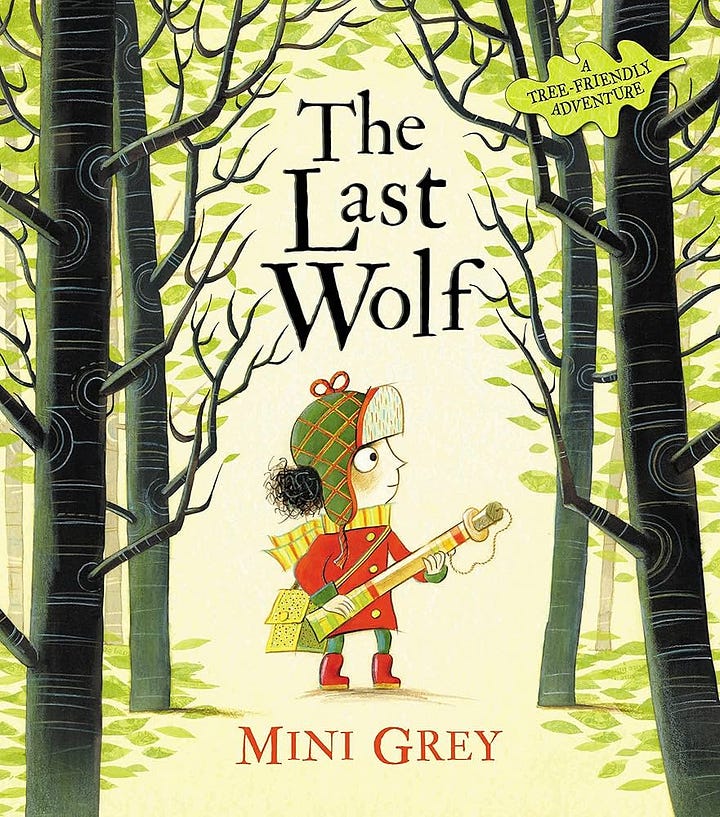
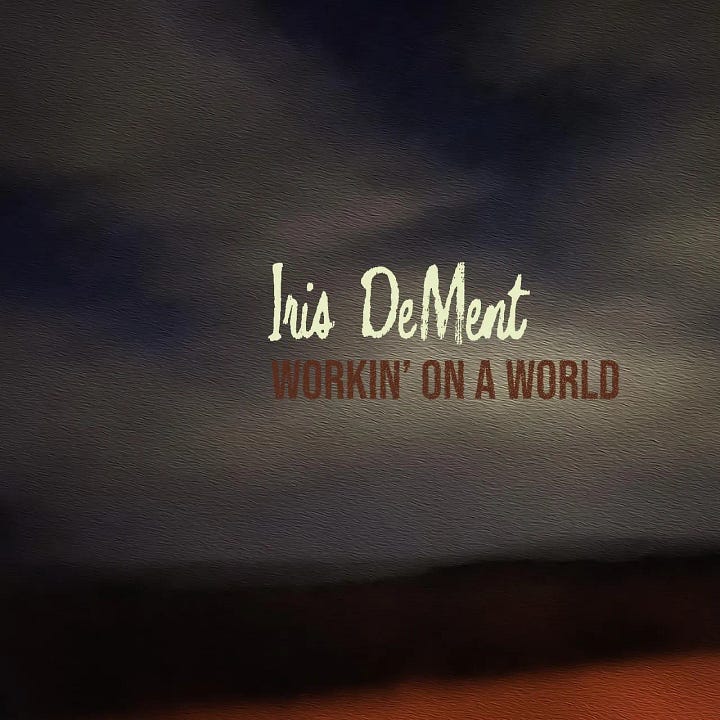
After dinner, Red’s Mum found a sign on Red’s bedroom door: ‘WANTED: MORE TREES PLEASE, IF YOU FIND SOME, TELL RED’. “Well, we’d better make some,” said Red’s Mum. “All you need is a seed, some earth, sun, air, water, and … for a really wonderful tree, about a hundred years.”
The Last Wolf, Mini Grey
Now I'm workin' on a world I may never see
I'm joinin' forces with thе warriors of love
Who came beforе and will follow you and me
I get up in the mornin' knowing I'm privileged just to be
Workin' on a world I may never seeWorkin’ On A World, Iris DeMent
Currently reading: I Gave You Eyes and You Looked Toward Darkness, Irene Solà

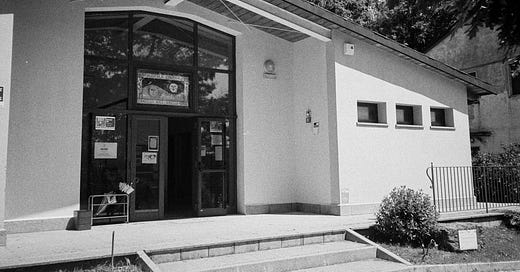



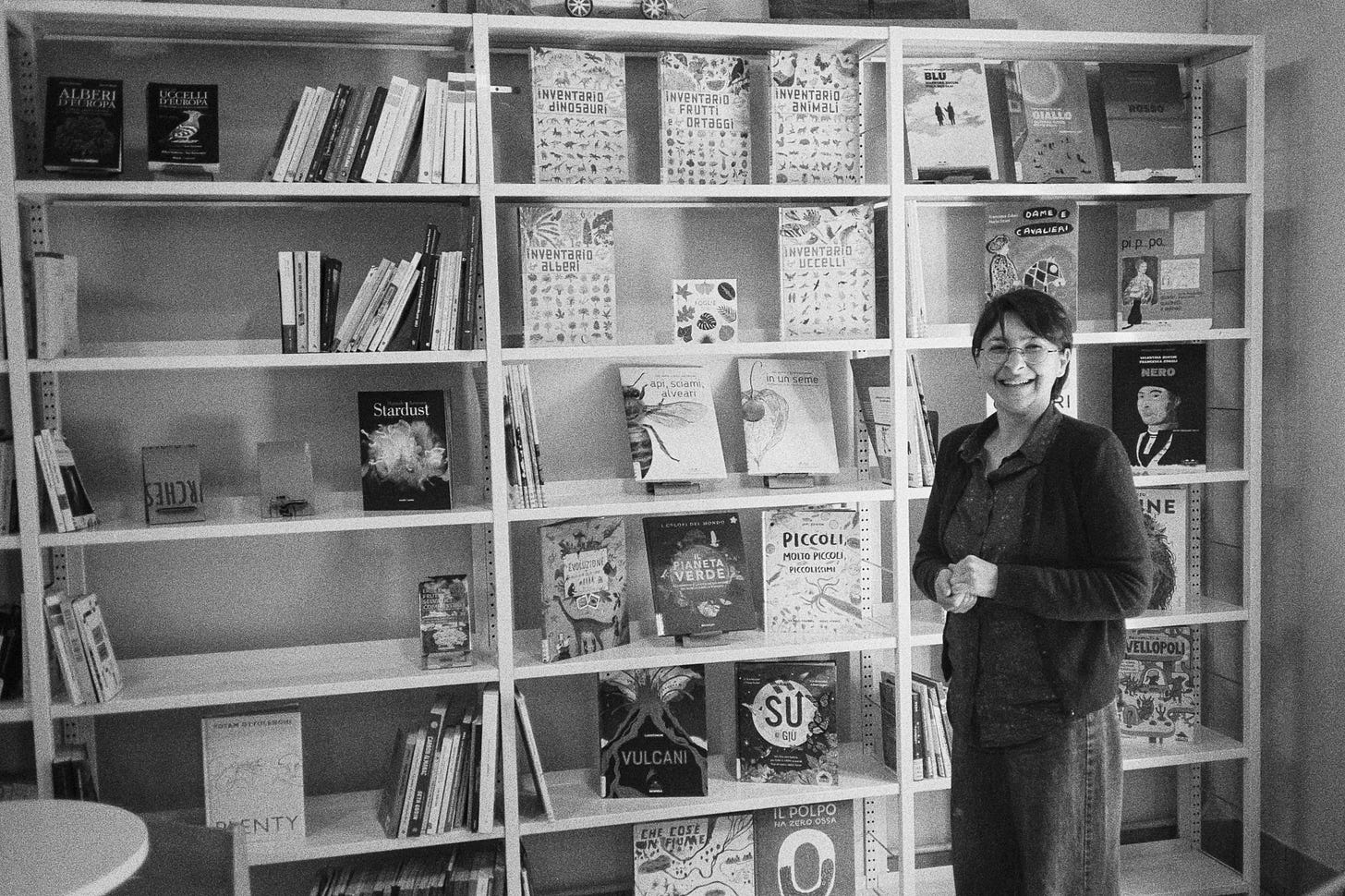
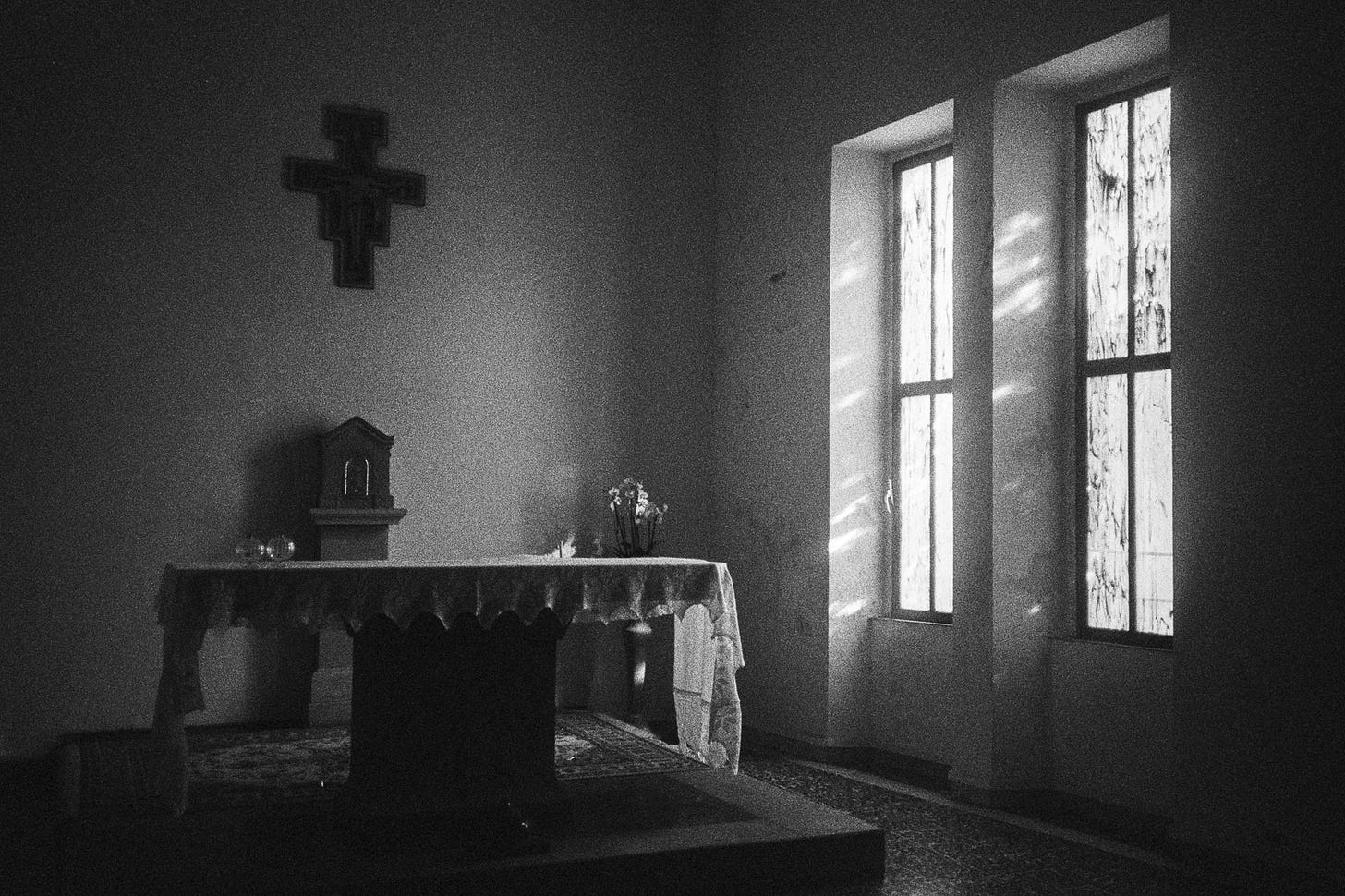
Excellent article! I totally agree about children's books being good for learning languages, I've got a book of German language bedtime stories which I love reading.
Poetry is notoriously difficult to translate, and (for me) the most difficult type of literary writing to read in a foreign language.
Interestingly the word for honey in Scottish Gaelic is 'mil' and the word for sweet is 'milis'.